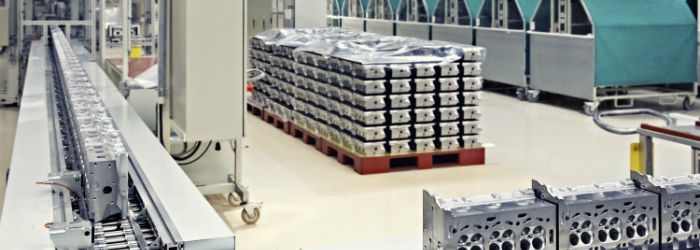Manufacturing process control automation

Your manufacturing process controls, which include all of the systems that control your production processes, enable you to increase the efficiency, productivity, reliability and safety of your operations. These controls let you keep processes running within precise limits and make adjustments as needed.
Many modern manufacturing operations, however, are highly complex, which makes it hard and sometimes nearly impossible to control them manually. Manufacturing process control automation allows you to keep things running smoothly and make continual improvements without needing exceptionally large workforces. With a state-of-the-art process control system, you can combine components such as Human Machine Interface (HMI), Supervisory Control and Data Acquisition (SCADA), Reporting, Alarming, Messaging and soft Programmable Logic Controllers (PLCs) into one integrated platform and automate significant portions of your operations.
Advantages of automating process control
So, what are the benefits of process automation? Adding automation into your manufacturing process control systems can have a wide range of benefits, from reduced resource use to improved product quality. Even if you believe your process control is already optimized, it can be beneficial to take a look at it, as continual improvement is essential to success in today's competitive markets and ever-evolving regulatory environment. Some of the advantages that come along with automating process control include the following.
1. Improve energy efficiency
Manufacturing operations typically require significant energy consumption, but reducing energy use is an excellent way to decrease costs and improve environmental performance. With the help of process control systems, plant managers can oversee operations and access information such as precisely how much electricity each piece of equipment used over a given period. By combining this information with other production data, they can uncover what factors influence energy consumption and determine the optimal energy use levels.
For example, Gόrażdże Cement, one of the largest manufacturers of cement in Poland, reduced its costs by as much as 20% by monitoring and improving the overall equipment effectiveness of its palletizing and stretch hood machines.
2. Cut costs, waste and errors
When you introduce more automation into your operations, you need less manual input to accomplish the same amount of work. It also lets you complete multiple tasks at once. In addition, by monitoring and analyzing the materials you use in producing goods, you may find ways to cut waste. Furthermore, automation reduces the likelihood of human error, which eliminates costs associated with wasted materials, returns and warranty payments.
3. Improve productivity and response time
Automated systems can input data, run analyses and perform other functions much faster than you otherwise could. These systems also work 24/7, so you can process orders and analyze processes overnight, rather than waiting for employees to come into work in the morning. This can help you get orders out faster, making your company more productive and profitable. This speed also makes your processes more flexible, as you can quickly analyze data to determine what changes you need to make.
4. Enhance product quality
Automation of process control can help you to improve the quality of your products by implementing enhanced quality control and reducing the number of errors made. Automation makes in-process testing of products much easier, allowing you to catch problems sooner.
Increasing the amount of automation that you use also reduces the chances for manual error to find its way into your processes. With automation, you'll have fewer mistakes and more consistent results. You may also be able to use process control systems to uncover ways you can improve your processes to enhance the quality of your products directly.

Adding process control automation into your manufacturing has a range of benefits, from reduced energy use and improved efficiency to enhanced product quality.
How process control automation impacts all departments
Process control automation affects nearly all aspects of manufacturing operations. It's vital to use data to monitor, control and visualize plant operations. But to get the most out of your data, you need to make sure it's available across departments. This will help you to leverage your data to make improvements and make certain that all aspects of operations are on the same page. Part of manufacturing process control optimization is ensuring that information is available wherever it's needed and that data isn't kept in silos. Here's how process control automation may impact the various departments of your company.
1. Operations
On the operations side, process control automation can give you information about whether you are successfully adhering to your plans and meeting your goals. You can easily see how your equipment is operating in real-time, as well as how it's operated historically. The HMI function of our zenon Software Platform, lets you securely and easily operate equipment remotely and make changes without having to pause production. This helps to increase productivity and uptime. With zenon, you can also integrate new and existing machines into one system, enabling easier plant-wide operation.
2. Production
Process control automation also offers benefits during production. The data you gather can help to determine where bottlenecks exist in your processes so you can avoid or prevent them, increasing efficiency. For example, zenon's Batch Control automates batch-orientated manufacturing processes and offers complete process and equipment control. The tool is user-friendly and hardware-agnostic and can assist in optimizing production.
zenon can help you gather process data automatically and input it into your system via stationary terminals and mobile devices. Collecting data this way, rather than manually on paper, helps to eliminate errors. With zenon, your data is immediately archived and always accessible. You can view the initial results of a production run during the process and access full reports immediately following the processes' conclusion. This saves you time and allows you to get your batch to market more quickly.
3. Quality
Another benefit is improved quality assurance practices, which help improve the overall quality of your products. Process control automation makes it easier to collect and analyze production data that relates to quality assurance. This increases transparency across your processes and helps inform future decisions. Increasing the amount of automation in your processes also reduces the likelihood of human error and may help you identify defects you might otherwise have missed.
This is especially useful in industries that have strict requirements for product quality and reporting, such as the pharmaceutical industry. The reports and analyses provided by platforms such as zenon help you to meet these requirements.
4. Maintenance
Implementing automation in your process control can also help you to reduce your maintenance costs, improve your equipment's performance and reduce downtime. It can help you to take your maintenance program from reactive to predictive. With a predictive maintenance program, you monitor equipment for signs of potential issues and use this information to inform your maintenance schedules.
With a software platform like zenon, you can collect equipment data automatically via sensors in real time, store it and analyze it to predict future maintenance needs. This reduces the effort you need to put into planning your maintenance while improving your results.

Process control automation affects many aspects of a manufacturing plant, including engineering, production, maintenance, management and customer satisfaction.
5. Engineering
You can also introduce automation into your engineering, enabling you to make even complex processes relatively easy to create and execute. With automated engineering, you can accomplish things that you couldn't with manual processes, helping you to keep up with and surpass the competition. For example, with zenon, you can use wizards that will guide you through the user interface and create parts of your projects automatically. This is helpful for repetitive tasks and situations in which you use templates. You may also be able to use external planning systems to generate your entire project automatically.
6. Customer
Automation process control can also help improve the efficiency of your plant and allow you to fulfill customer orders faster. Monitoring, gathering and analyzing data about plant operations can provide you with insights that you can use to improve your response times. You might find, for instance, that a certain piece of equipment operates more slowly than other machines or that there's room for improvement in a particular step of your production process. Improving your response time in this way helps you to meet customer needs faster, increasing customer satisfaction. It also means you can fulfill more total orders, increasing your productivity and profitability.
7. Management
Management can also use data to gain insights into plant-wide and even cross-site performance. It can help to provide an overview of operations, in addition to details. Managers can use process control automation to look into key performance indicators of the plant and to improve business processes. The convergence of information and operational tech allows business process automation across a variety of areas. For example, zenon integrates with enterprise resource planning (ERP) systems such as SAP using native interfaces. This eliminates the need to manually transfer data between these two systems and creates a homogeneous environment that connects business intelligence with the plant floor data. It lays the foundation for cloud computing and analytics, enabling a host of cutting-edge initiatives to manage your manufacturing business smarter and better.
How will your industry benefit from process control optimization?
Many industries within the manufacturing and industrial sectors can benefit from process control optimization. The custom manufacturing software packages by zenon are applicable to many kinds of processes and solutions in various industries.
To find out how your industry can get the most out of zenon Software Platform for your unique use case, talk to our experts today or scroll down to learn more about the primary industries we serve:

The growing demand for vehicle customization has led the automotive industry to deploy Just in Sequence (JIS) production.
Automotive
The automotive industry is highly competitive. Auto manufacturers need to produce high volumes of vehicles and continuously innovate to keep up with customer demand and the competition. The growing demand for vehicle customization, for instance, has led automakers to deploy Just in Sequence (JIS) production. Optimizing process controls can enable these companies to achieve these goals. It can create conditions that are right to ensure product quality and help them to produce vehicles and components more quickly. Automotive manufacturers can incorporate zenon into their existing facilities and across all processes, providing a holistic view of their operations. They can benefit from automated engineering, alarm management, smart factory automation and other features.
Food and beverage
Food and beverage producers can implement manufacturing process automation to increase the efficiency and productivity of their manufacturing processes. This can help these manufacturers stay competitive and open up new possibilities to create innovative products and solutions. Process control automation allows you to incorporate aspects of industry 4.0 into your operations. Automation can reduce costs associated with energy use and line management. It can also help manufacturers to meet the reporting and quality requirements of the industry and make better products for customers at a lower cost.
Pharmaceutical
Compliance with strict standards and requirements is a central concern in the pharmaceutical industry. One of the main advantages of process automation for this sector is that it makes compliance easier. zenon offers configuration wizards, pre-defined symbols and other features that assist with this. Process control optimization and automation can help with nearly every aspect of production and processing. zenon offers benefits for batch control, recipe management and automated reporting, increasing flexibility, reliability and response time. These features help connect production and quality assurance, leading to improved data integrity and product quality.
Cross-industry
Whatever industrial sector you work in, zenon’s automation software packages can help you smooth out the engineering and operation of your facilities. zenon is designed to integrate easily into pre-existing environments and be flexible, scalable and user-friendly once integrated. Companies can tailor the software packages to their needs and use it to accomplish a wide range of goals, from boosting productivity to reducing energy consumption to ensuring product quality.
Get started with zenon Software Platform
Business process automation software comes with many benefits across many different areas of operation. Manufacturing plants, energy utilities and other industrial players can use it to improve productivity and efficiency, reduce costs and enhance product quality. zenon makes achieving these benefits with unmatched openness and connectivity along with user-friendly interfaces.
zenon Software Platform has helped our customers optimize their process control since 1987, and over time, we at COPA-DATA have continuously improved it to ensure it meets the every-changing needs of our customers.
To learn more about how zenon can help you improve your manufacturing processes, contact us today.














































